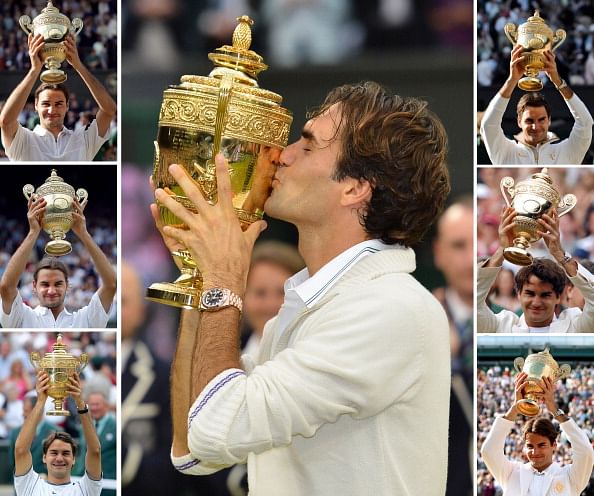
The Roger Federer Story

Every great story needs great characters. Heroes, villains’ and sometimes (d)jokers too. Roger Federer’s story is one of the greatest in sports history; and his on-court rivalries with the likes of Hewitt, Safin, Roddick and Nalbandian early on, coupled with his continued ones with Nadal, Djokovic and Murray now, span one of the greatest periods in men’s tennis history.
I come from a family of tennis aficionados. My mum regaled me and my sister with tales of how she had debates with her siblings over Borg and McEnroe. Thus, my interest in tennis was nurtured since my childhood. Although, I don’t think I was genuinely excited about following the sport keenly, till Federer came along. The sheer elegance of his game would have been a good enough reason. But then we are talking about Federer here. He does not just surprise you. He leaves you awestruck. I distinctly remember the discussions in our school bus after he won Wimbledon in 2003. Up until then, people knew about tennis vis-à-vis Sampras and Agassi. Most people just watched Wimbledon, not even the other Grand Slams. It is to Federer’s credit that through his racquet that he almost wields like a magic wand, he has not only managed to create tremendous popularity for the sport of tennis but also made people more interested in the entire ATP calendar.
There are numerous articles that speak about Federer’s greatness, his records, the statistics, his strengths, his weaknesses and the whole nine yards. But you cannot measure the impact a sportsman leaves by being merely quantitative in your analysis. In my humble opinion, what makes Federer so great is that almost every time he walks on to the court, he is creating history. He is either breaking a record or better still, making one. This is testimony to his longevity and consistency. It is rare to see someone perform at a high level throughout a season. Novak did it in 2011, Rafa the year before that. Federer has been doing it for the past decade, barring a couple of off seasons, by his own high standards. He is 31 years old, and yet his passion for the game and his hunger to compete at the highest level, shows his commitment to the sport and to his fans. Tennis as a sport has become increasingly physical with almost most title matches going the distance and pushing the boundaries of human stamina. In spite of that, Federer, who is not the youngest on the tour, and has recently become a father, has played more tournaments this year and has been always in the running at the big events. Federer has never been lackadaisical (even for a charity match) and it is this commitment and level of professionalism that has endeared him to crowds all around the globe.
If money or fame was the motivation, Federer could have retired or taken it easy a while back. Contrary to that, the increased competition and the physical and/or mental limitations of his own, have spurred him on to work harder and smarter. This is where I see a similarity between him and Sachin Tendulkar. Both are legends in their own right, universally loved and respected. Both understand the pressure of expectations and have dealt with it better than anyone else. Both play because they love and respect the sport. Both play because they are true sportsmen, who compete fiercely on the court, but once the contest is over, realize that it is over. They are statesmen of sorts, icons, larger than life. Roger Federer has been a voice of reason for several years now when it comes to various aspects of the men’s tour. He is the darling of the media, not just because he can speak multiple languages, but also because of his conduct. He is refined, dignified and humorous. He is also human, and does not shy away from giving way to emotions when it matters to him the most. His emotional breakdown after a loss to Rafael Nadal at the Australian Open, 2009 was more so because of the context of the entire match. Federer was once again, going for history. The fact that the great Rod Laver was there to present the trophy raised the stakes further. His reaction, to me, shows how much tennis, the legends of the game and the legacy of it all means to Roger. Tennis is considered a gentleman’s sport and there could be no better ambassador of that philosophy than Roger Federer.
From the green grass of Wimbledon to the hard courts of Flushing meadows, the clays of Rolland Garros to the courts at Melbourne Park, Federer has entertained and enthralled us all. We are a privileged lot. We are all a part, albeit insignificant, but still a part of the great story of Roger Federer.